#The Resurrectionists
Text
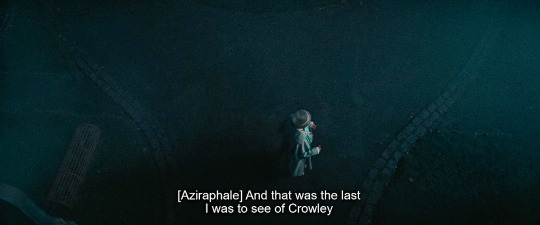
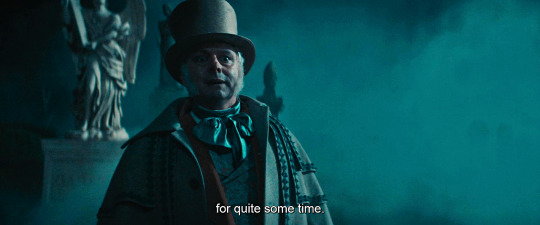
The fact that Aziraphale emerges from this flashback
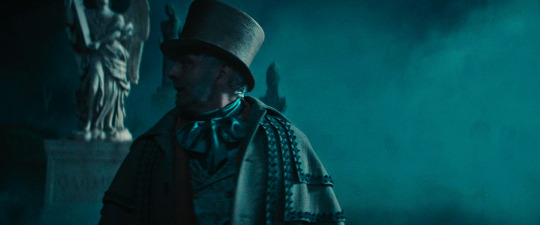
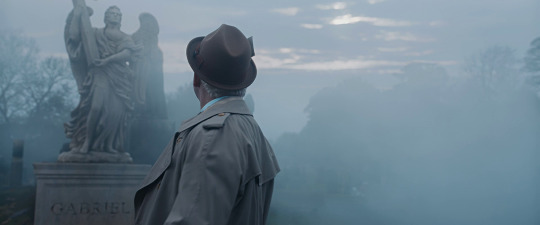
Makes this face
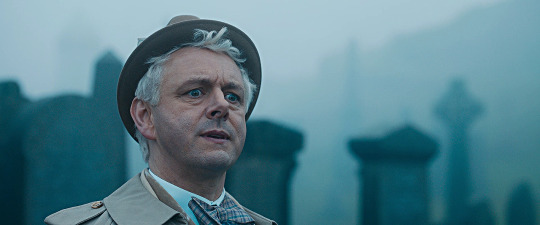
and then with a ginormous gap on the right side of the screen, proceeds to be like "I must call Crowley right now immediately."
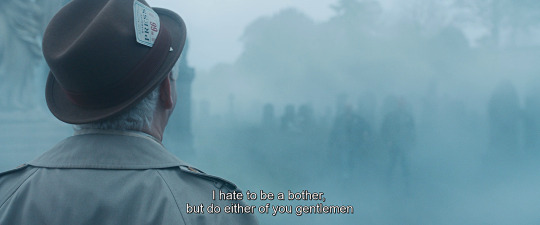
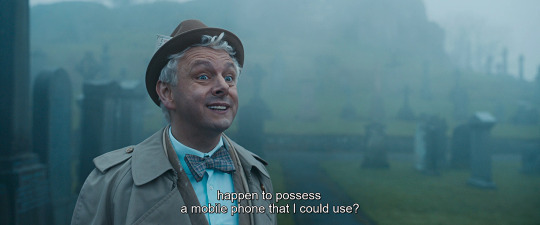
#I believe that Aziraphale in s2 is just as worried as Crowley is#he's just shoving it as far as possible under his little hat#good omens 2#v watches good omens#Aziraphale#I Know Where I'm Going#The Resurrectionists#i am this close to analyzing the screen composition during their phonecall because it's. interesting.#started thinking about this scene when they mentioned changing the weather based on Aziraphale's mood#good omens meta#more in the notes
11K notes
·
View notes
Text
Ok so I know I posted the whole set, but I keep coming back to this particular moment-

Because look at this whole situation. Aziraphale steps forward, directly into Crowley’s shadow. Not only is he getting closer, right into his personal space, but suddenly Crowley's face is going to be a lot clearer, not backlit anymore. At the same time the Crowley's hand retreats just a little from almost grabbing and dragging Aziraphale's cravat to doing a pointy finger. And then we have-

Where the eye contact is basically the most indecent thing I've ever seen. It's just... a lot.
#i'll see myself out#good omens#good omens s2#the resurrectionists#ineffable husbands#gif analysis#gif set#aziracrow#goomens#crowley x aziraphale#i am so unwell over them#a duck gifs#a duck talks
3K notes
·
View notes
Text
Here's some of my favorite Crowley on laudanum moments, just because:
1. Death is "just wrONGGG", Crowley said so. No more dying.
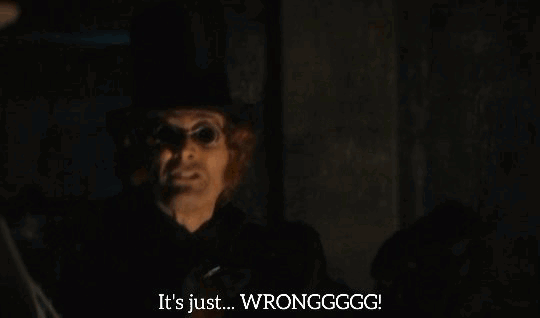
2. Because if you don't get high and improvise the unofficial anthem of Scotland (it's canon, Crowley improvised it), what are you even doing with your overly long life?
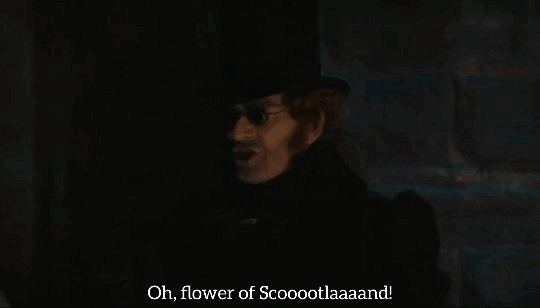
3. This lil dance is the best, I swear.
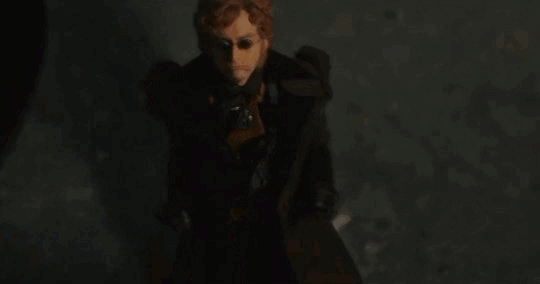
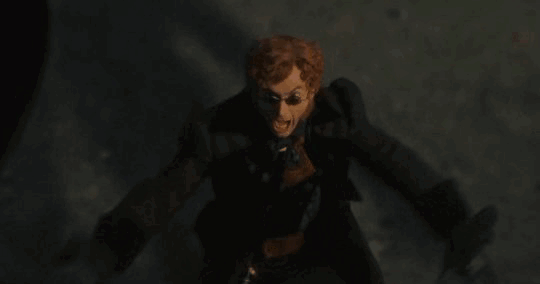
4. Reminder, he's looking at a graveyard, at night.

5. Find me someone cuter, I'll wait.
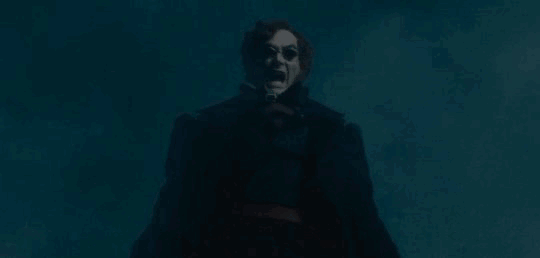
6. It was dark, he was wearing sunglasses, and he was high. Leave him alone.
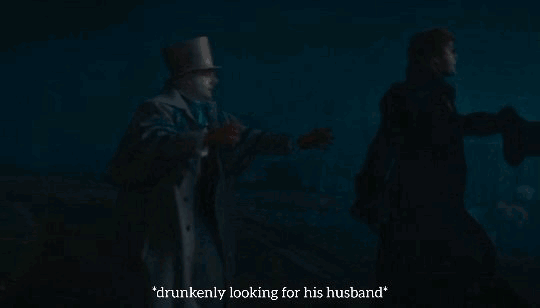
7. I am petrified.
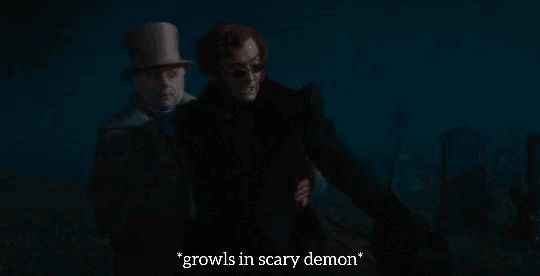
And bonus points because I will never get over this:

No, don't be shy, get closer.
#I swear that last gif brings me to my knees#VERY subtle#wipe your smirk off your face kind sir#my favorite minisode changes day to day#today it's this one#I'm excited to see what tomorrow may bring#good omens#good omens minisode#the resurrectionists#crowley#aziraphale#crowley x aziraphale#david tennant#michael sheen#good omens season 2#crowley laudanum#laudanum#drunk crowley#good omens gifs#good omens gifset#gifs#ineffable husbands#ineffable drunks
1K notes
·
View notes
Text
Do you ever really think about what happened in The Resurrectionists?
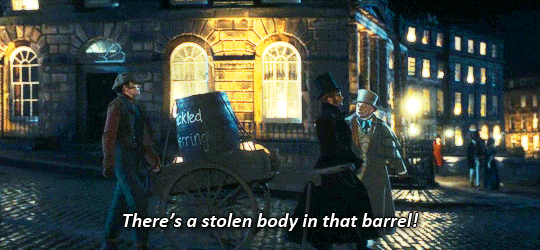
Aziraphale spent that entire time trying to save Elspeth's soul from being damned to Hell.
Every questionable choice he made was done so because he was trying to help Elspeth and also trying to find new ways to decrease human suffering.
He was working really fucking hard to do his job, but he made mistakes along the way because he is constantly struggling with the knowledge that the rules become a lot more convoluted as life becomes more complicated.
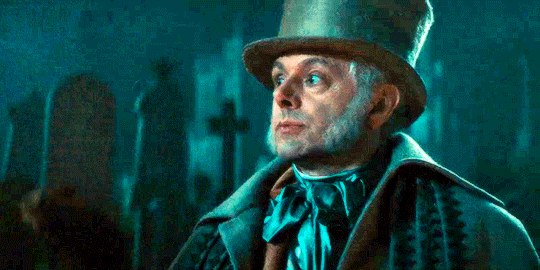
Digging up bodies is wrong, but Elspeth was poor and acting in desperation to take care of herself and Wee Morag so they wouldn't have to continue living on the streets.
He is the one who encouraged her to dig up another body because he realized that Mister Dalrymple was trying to help teach those learning to become doctors so they could do better to decrease human suffering when it was their turn to help others.
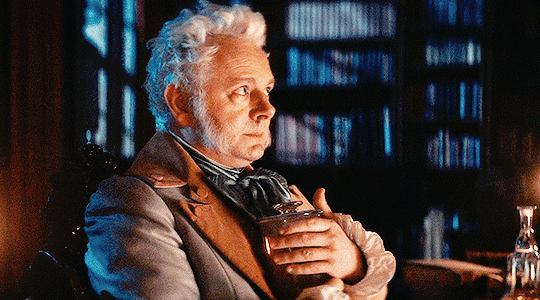
He wasn't able to save Wee Morag after she was shot by a grave gun, and watched in dismay as Elspeth sold her body to Mister Dalrymple so she could get off the streets.
And when that didn't work the way she'd hoped, she decided that her life meant nothing anymore and decided she was better off dead.
Aziraphale had been spending that entire minisode trying to save Elspeth's soul from Hell, but he ultimately realizes that he made things worse even though he was trying so hard to do the right thing.
Heaven didn't care that he failed. Heaven has already said "we're the good guys, we're just not doing anything to stop the bad guys". Aziraphale was doing the job given to him by God. He made a mistake, but he thought he was doing the right thing because he cares about human souls. He still wants to protect humanity from Hell. That's literally his job.
Crowley saw someone digging up a body in the graveyard and immediately realized he didn't need to do anything.
Instead he watches.
He listens to Elspeth and finds it easier to sympathize with her plight because he's in the same boat in many ways. It doesn't matter what he does because he won't be able to climb his way out of Hell.

He listens to Aziraphale and he challenges the angel when he disagrees with some of the things he's saying.
He doesn't interfere with Elspeth or Aziraphale though.
The discussion that he and Aziraphale have with Mister Dalrymple teaches Crowley something just as much as it teaches Aziraphale.
Before he learns the reason that Mister Dalrymple cuts open dead bodies in the first place, he's cheering to the idea of more murder.
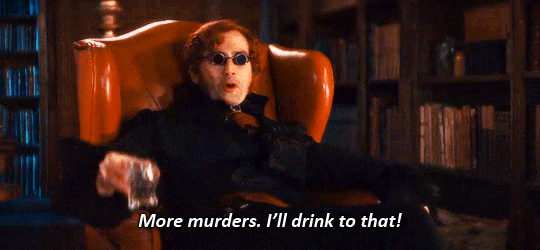
That tumor that Aziraphale hugs to his chest is just as much of a learning moment for Crowley. He hadn't considered why someone might have a good reason to cut up dead bodies, but Crowley and Aziraphale both love children and they both just learned that a child died with a tumor inside of him.
Crowley didn't realize anymore than Aziraphale did just how much danger Wee Morag and Elspeth were in from digging up bodies of rich people.
It was when Crowley saw that Elspeth was about to kill herself that he realized he could no longer sit back and do nothing.
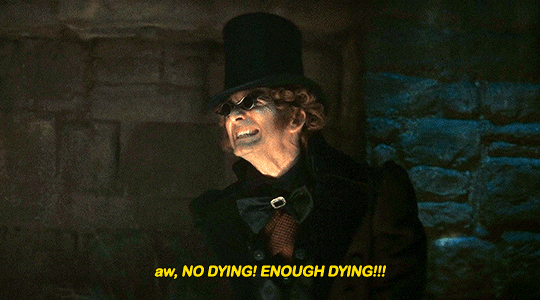
As a demon, it should have been easier for Crowley to accept that Hell was winning another soul, but the truth is that the entire time Aziraphale was working so hard to save Elspeth's soul, Crowley was able to act as a spectator because she was already headed down the path towards Hell.
Crowley had just watched Aziraphale work so hard to save this human soul, this soul who had just lost the woman she loved who was wanting to end her own life so she could see Wee Morag again, and he realized he couldn't sit back and watch anymore. He knew Elspeth wouldn't see Wee Morag again if she killed herself because Hell cares just as little about how complicated human life is as Heaven does.
He used Aziraphale's money to bribe Elspeth into being properly good so she could go to Heaven. He saved her knowing that he was offering the win to Heaven just so she could see Wee Morag again.
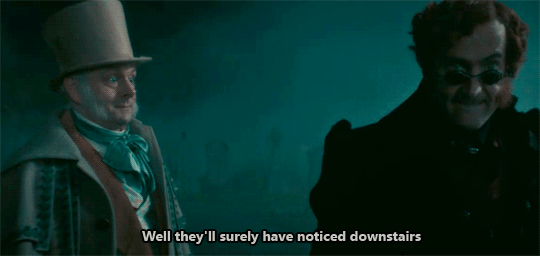
It's important to remember that neither Heaven nor Hell give a single solitary fuck about humanity or the complications that arise as life becomes more problematic. Humanity exists within all shades of grey.
Heaven does nothing to stop Hell. Hell spends eternity torturing humans and other demons. Neither side is good. Neither side is ideal.
And in the end, Crowley did what he did because Aziraphale was doing the right thing by trying to save Elspeth's soul from eternal torment, something she doesn't deserve because she was simply trying to survive in a system that has always put poor people at a disadvantage. Aziraphale learned this too. He learned that there is no inherent virtue behind poverty.
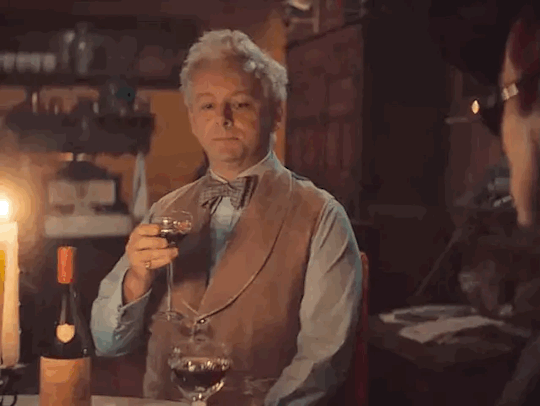
To shades of grey.
#good omens#good omens meta#the resurrectionists#aziraphale#crowley#elspeth and wee morag#heaven and hell#shades of grey
965 notes
·
View notes
Text
Wait, traveller! It’s dangerous to go alone, take this…
*I hand you tiny, high on laudanum, 1800s Scottish Crowley*
#good omens#good omens 2#anthony j crowley#crowley#victorian crowley#the resurrectionists#david tennant
769 notes
·
View notes
Text
Aziraphale's Decision
The Resurrectionists is a great minisode that shows us a significant little piece of Aziraphale's character arc, his realization that things on earth are never as black and white as they seem in heaven. But I just want to take another look at this heartbreaking moment here.
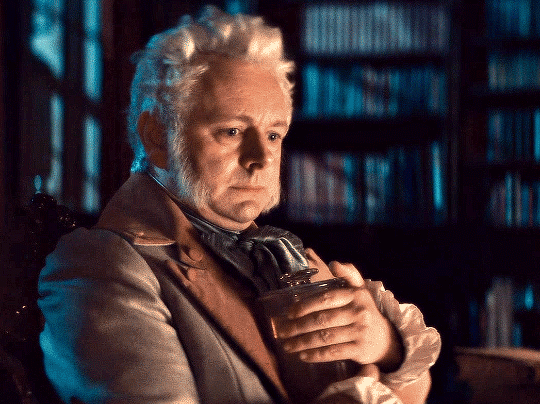
This was the turning point here, when he realized the practical need for dead bodies and how they're used. You can almost watch the switches flickering back and forth in his mind as he readjusts his world view.
After staring at this gif for a long time (and only crying a little), I've decided that it's not just a turning point in that specific narrative. It's also foreshadowing.
Check it out.
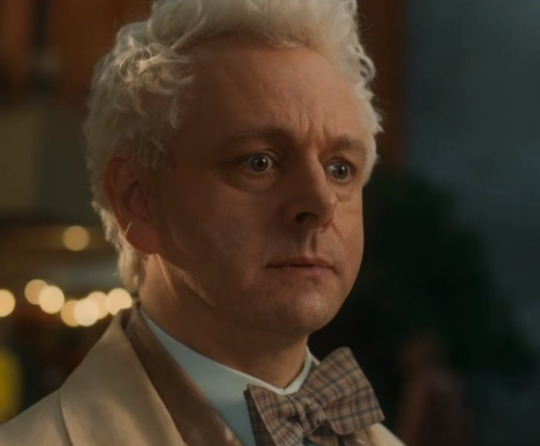
I don't have a gif unfortunately, but I know you see it too. This is his face after Metatron says, "We call it the second coming."
Once again, click-click-click go the switches. Initially (imo) he was going along with the Metatron to appease him and protect Crowley. This is the moment where his perspective shifts from "Protect Crowley" to "Protect EVERYTHING" and from that point on his path is clear.
He might have thought, just for a moment, that maybe Crowley was right and they really could just be themselves with each other and screw everyone else. But not with the second coming on the horizon. My dude collects books of prophecy, he knows EVERYTHING that's been foretold, and he knows that there will be no Alpha Centauri, no "us," no safety or freedom anywhere in the universe once shit gets real.
Whether or not he made "the right decision" at the end of season two is irrelevant. He made the only decision possible. Running away was never an option; it's not who Aziraphale is.
#good omens#aziraphale#crowley#ineffable husbands#good omens 2#aziraphale my beloved#good omens season 2#meta#fuck the metatron#good omens meta#The Resurrectionists
791 notes
·
View notes
Text
Historical Analysis: class and injustice in 'The Ressurrectionists' minisode
Alternate title: why we're tempted to be upset with Aziraphale and why that's only halfway fair
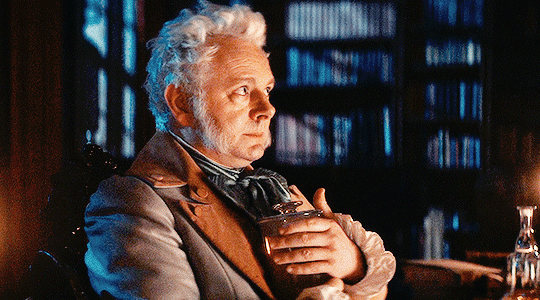
Okay so first off huge thanks to @makewayforbigcrossducks for asking the question (and follow-up questions lol) that brought me to put these thoughts all together into a little history nerd ramble. That question being, Why is Aziraphale so clueless? Obviously, from a plot perspective, we know we need to learn some lessons about human moral dilemmas and injustices. But from a character perspective? A lot of this minisode is about Aziraphale being forced to confront the flaws of heavenly logic. This whole idea that "poverty is ineffable" basically boils down to 'yeah some people are poor, but their souls can be saved just as if not more easily that way, so it's not our problem and they probably deserve it anyway for not working hard enough,' a perspective that persists in many modern religious circles. Aziraphale isn't looking at the human factor here, he's pretty much purely concerned about the dichotomy of good and wicked human behavior and the spiritual consequences thereof, because that's what he's been told to believe. His whole goal is to "show her the error of her ways." He believes, quite wholeheartedly, that he's helping her in the long run.
"the lower you start, the more opportunities you have"
So here's what we're asking ourselves: Why did it take him so bloody long to realize how stupid that is? Sure, he's willing to excuse all kinds of things in the name of ineffability, but if someone in the year of our lord 2023 told me he was just now realizing that homelessness was bad after experiencing the past two centuries, I'd be resisting the urge to get violent even if he WAS played by Michael Sheen.
Historical context: a new type of poverty
Prior to the 19th century (1800s), poverty was a very different animal from what we deal with now. The lowest classes went through a dynamic change leading up to the industrial revolution, with proto-industrialization already moving people into more manufacture-focused tasks and rapid urbanization as a result of increasingly unlivable conditions for rural peasantry. The enclosure of common lands and tennancies by wealthy landowners for the more profitable sheep raising displaced lots of families, and in combination with poor harvests and rising rents, many people were driven to cities to seek out new ways of eeking out a living.
Before this, your ability to eat largely would have depended on the harvest in your local area. This can, for our purposes, be read as: you're really only a miracle away from being able to survive the winter. Juxtapose this, then, with the relatively new conundrum of an unhoused urban poor population. Now if you want to eat, you need money itself, no exceptions, unless you want to steal food. Charity at the time was often just as much harm as good, nearly always tied deeply up in religious attitudes and a stronger desire to proselytize than improve quality of lie. As a young woman, finding work in a city is going to be incredibly difficult, especially if you're not clean and proper enough to present as a housemaid or other service laborer. As such, Elspeth turns to body snatching to try to make a better life for herself and Wee Morag. She's out of options and she knows it.
You know who doesn't know that? Aziraphale.
The rise of capitalism
The biggest piece of the puzzle which Aziraphale is missing here is that he hasn't quite caught onto the concept of capitalism yet. To him, human professions are just silly little tasks, and she should be able to support herself if she just tried. Bookselling, weaving, farming, these are all just things humans do, in his mind. He suggests these things as options because it hasn't occurred to him yet that Elspeth is doing this out of desperation, but he also just doesn't grasp the concept of capital. Crowley does, he thinks it's hilarious, but Aziraphale is just confused as to why these occupations aren't genuine options. Farming in particular, as briefly touched on above, was formerly carried out largely on common land, tennancies, or on family plots, and land-as-capital is an emerging concept in this period of time (previously, landowners acted more like local lords than modern landlords). Aziraphale just isn't picking up on the fact that money itself is the root issue.
Even when he realizes that he fucked up by soup-ifying the corpse, he doesn't offer to give them money but rather to help dig up another body. He still isn't processing the systemic issues at play (poverty) merely what's been immediately presented to him (corpses), and this is, from my perspective, half a result of his tunnel-vision on morality and half of his inability to process this new mode of human suffering.
Half a conclusion and other thoughts
So we bring ourselves back around to the question of Aziraphale's cluelessness. Aziraphale is, as an individual, consistently behind on the times. He likes doing things a certain way and rarely changes his methodology unless someone forces his hand. Even with the best intentions, his ability to help in this minisode is hindered by two points: 1)his continued adherance to heavenly dogma 2)his inability to process the changing nature of human society. His strongest desire at any point is to ensure that good is carried out, an objective good as defined by heavenly values, and while I think it's one of his biggest character hangups, I also can't totally blame him for clinging to the only identity given to him or for worrying about something that is, as an ethereal being, a very real concern. Unfortunately, he also lacks an understanding of the actual human needs that present themselves. Where Elspeth knows that what she needs is money, Aziraphale doesn't seem to process that money is the only solution to the immediate problem. This is in part probably because a century prior the needs of the poor were much simpler, and thus miraculous assistance would never have interfered with 'the virtues of poverty'. (You can make someone's crops grow, and they'll eat well, but giving someone money actually changes their economic status.) Thus, his actions in this episode illustrate the intersection of heavenly guidelines with a weak understanding of modern structures.
This especially makes sense with his response to being told to give her money. Our angel is many things, but I would never peg him as having any attachment to his money. He's not hesitant because he doesn't want to part with it, he's hesitant because he's still scared it's the wrong thing to do in this scenario. He really is trying to be good and helpful. So yes, we're justifiably pretty miffed to see him so blatantly unaware and damaging. He definitely holds a lot of responsibility for the genuine tragedy of this minisode, and I think Crowley pointing out that it's 'different when you knew them' is an extremely important moment for Aziraphale's relationship with humanity. Up until now, he's done a pretty good job insulating himself from the capacity of humans for nastiness, his seeming naivity at the Bastille being case in point.
In the end, I think Aziraphale's role in this minisode is incredibly complex, especially within its historical context. He's obstinate and clueless but also deeply concerned with spiritual wellbeing (which is, to Aziraphale, simply wellbeing) and doing the right thing to be helpful. While it's easy to allow tiny Crowley (my beloved) to eclipse the tragic nature and moral complexity of this minisode, I think in the end it's just as important to long-term character development as 'A Companion to Owls'. We saw him make the right choice with Job's children, and now we see him make the wrong choice. And that's a thing people do sometimes, a thing humans do.
~~~
also tagging @ineffabildaddy, @kimberellaroo, and @raining-stars-somewhere-else whose comments on the original post were invaluable in helping me organize my thoughts and feelings about this topic. They also provided great insight that, in my opinion, is worth going and reading for yourself, even if it didn't factor into my final analysis/judgement.
If I missed anything or you have additional thoughts, please please share!!! <3
#this was a monster of a post to write#in no small part because I was relying more on my own historical knowledge than usual so I had to double check myself constantly#but I had a lot of fun and I hope you enjoyed it as much as I did#good omens#good omens 2#neil gaiman#good omens analysis#good omens meta#the resurrectionists#good omens season 2#good omens minisode#nerd shit#ineffable husbands#aziraphale good omens
560 notes
·
View notes
Text


Good Omens 2x03 - The Resurrectionists
#Good Omens 2#Good Omens 2 spoilers#goodomensedit#Crowley#1827 Crowley#the resurrectionists#anthony j crowley#Good Omens s2e3#go 2x03#my gifs
707 notes
·
View notes
Text
They were so close in filming that graveyard scene and for this minisode. The electricity is jumping off the screen here. Not to mention whatever the hell David is doing in the 2nd photo…



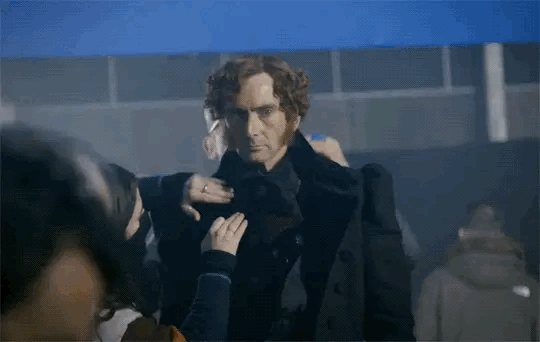
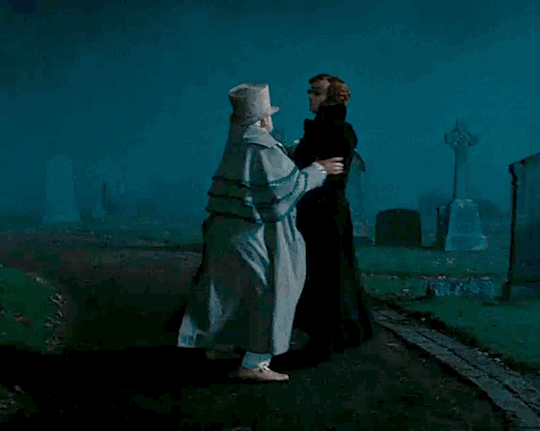


230 notes
·
View notes
Text

Detective Aziraphale is on his way! 🔎🤍✨
#good omens 2#good omens#aziraphale#good omens fanart#good omens season 2#michael sheen#art#digital art#i know where i'm going#the resurrectionists#detective aziraphale#michael sheen art#neil gaiman#terry pratchett#good omens art#crowley#aziracrow#ineffable husbands#ineffable art
261 notes
·
View notes
Text
thinking about this on my most recent rewatch
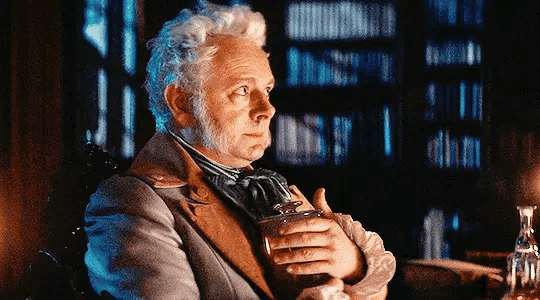
(gif source: ferndaphnia)
It can be kinda easy to get exasperated with Aziraphale sometimes for how much he’s struggling with what seem to us like really obvious moral non-dilemmas. How slowly and arduously he comes to the conclusion that Elspeth and other resurrectionists are meeting a need that polite society’s nonsensical arbitrary rules don’t yet have an answer for.
But this shot, this scene, just underlines to me how genuine and earnest his struggle is. He’s not being squeamish about graverobbing, like it offends his delicate sensibilities. He’s slowly unlearning some bullshit, and he comes by it honestly and is doing his best. He’s just learned that the contents of the glass jar in his hands are a tumor that was surgically removed from a 7 year old boy, who did not survive the ordeal. Look at his body language, look at his face (so much sorrow between those mutton chops!). If he were just squeamish, he would, idk, push the jar away from him, set it down, grimace. Not cradle it closer to his chest, as if it were the 7 year old boy he wishes he could comfort, as sadness and understanding washes over him.
#idk I had a very Big emotional and spiritual reaction the first time I touched a tumor in a medical setting maybe I’m projecting a bit#i am aziraphale a little bit sometimes#a lot sometimes#good omens#good omens meta#good omens season 2#the resurrectionists
365 notes
·
View notes
Text
I don't think we're talking enough about how the premise for the 1827 meetup in the cemetery was a date, pure and simple. There was no "uh oh, Aziraphale is in trouble again", no big point in history that both sides needed them to attend, no Arrangement at all... nope, it was an invitation and an accepted invitation. It was literally Crowley saying "hey angel, I saw a thing that you'll find funny (I was thinking about you), come and hang out with me about it" and Aziraphale does.

And I wonder what would have happened next if they hadn't stumbled across grave-robbing Elspeth and her moral dilemma.
#good omens meta#good omens#good omens s2#good omens 2#the resurrectionists#gos2#1827#if anyone wants to write this fic#or already has#i'd love to read it!!#good omens thoughts#ineffable husbands#aziracrow#ineffable spouses#it's also funny to me that this very well could have been Halloween#a duck talks
4K notes
·
View notes
Text
I love that the majority of the Scotland minisode, Crowley’s just dicking around, being a little shit. 😂
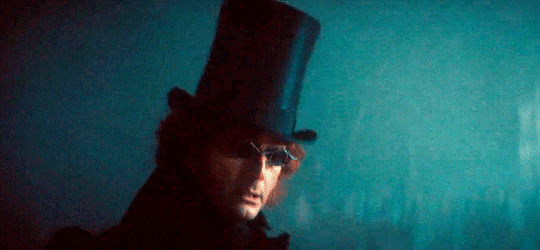
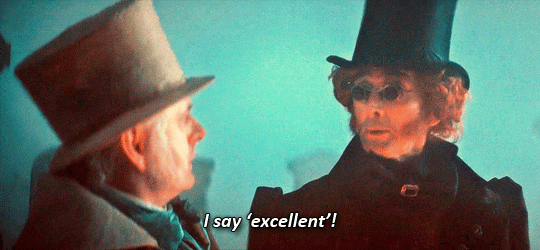
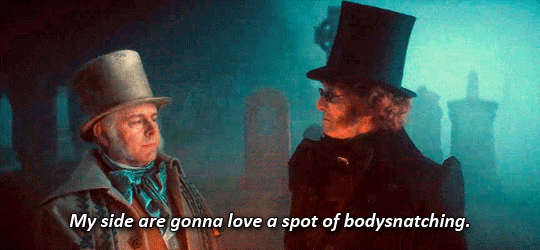

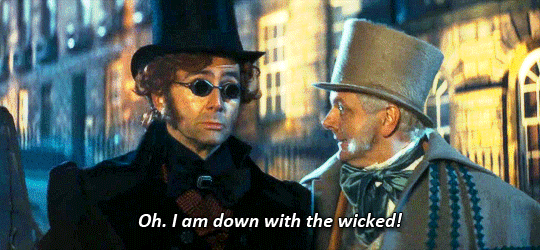
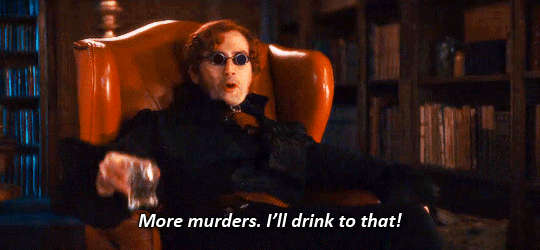
#i love this serpent bastard 🥰#anthony j crowley#the resurrectionists#gomens minisode#good omens 2#david tennant
354 notes
·
View notes
Text
You Say Potato, I Say Excellent! Or blocking, accents and legacy of morality tales in ‘The Resurrectionists’ minisode PART II
Alternate title: how Aziraphale’s naivety in this episode was supposed to make you a bit outraged
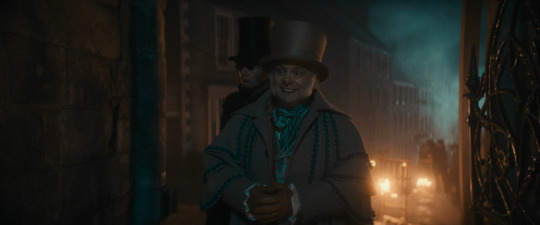
I have to shout out to @bowtiepastabitch for their AMAZING historical analysis of this minisode - it prompted me to finish this long ramble that has been drifting in my notes. Anyway, I have a major obsession with the ways blocking and dialogue interplay in Good Omens - you can check out my analysis of the blocking in the flashbacks in S1. But The Resurrectionists is really something special. This got so long I am splitting it into two parts.
What we see in this minisode is a morality tale - a genre of children’s literature that was extremely popular in the early 1800s where the minisode is taking place. Catch up on the historical background in Part I.
When looking at this minisode, it is really important to look at two complementary narrative tools - Crowley’s accent and the placement of Aziraphale in relation to Crowley. Through the minisode, Crowley switches between his standard English accent and a delightful Scottish accent. But the switching isn’t random!
Scottish lines = character Demon Crowley, who moves the plot of the story along
English lines = Crowley, the moral guide leading Aziraphale
Additionally, the two of them swap sides in their blocking frequently in this episode. Their standard placement is A/R + C/L but the swap to C/R + A/L is almost the norm in this minisode.
Analyzing Blocking and Dialogue
We open in the graveyard, with Aziraphale and Crowley in their standard placement, observing the statue of Gabriel. But then they notice Elspeth, digging up a corpse. When Aziraphale approaches Elspeth to inform her that her actions are Not Good, he actually ends up swapped with Crowley and finds himself on the left because what he is doing - making moral judgments on the actions of Elspeth with no understanding of what led her here - is doing Good, not good.
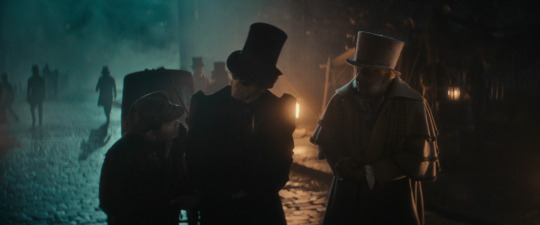
The next scene finds Crowley helping Elspeth cart the corpse away from the graveyard, while the trio debate all the other ways Elspeth could make money - Aziraphale suggests running a bookshop, farming, weaving, giving the standard Good party line about hard work blah blah blah. Aziraphale remains on the left - after all, those supposed options are completely unrealistic, unobtainable professions for someone in Elspeth's socioeconomic position. They aren't remotely helpful suggestions.
Aziraphale only finds himself back on the right when he and Crowley are introduced to Wee Morag, and have some time to listen and observe the reality of their situation.
Then, off we go to complete our journey to sell the body. Aziraphale and Crowley find themselves having a debate about morality, but Aziraphale is again ON THE LEFT as he waxes poetic about the virtues of poverty - doing Good, not good again. What I loved here was you saw the clear purpose between Crowley’s two accents as he switched mid-line -

Crowley: (SC) Oh, I'm down with wicked! (EN) Anyway, is it wicked? She needed the money.
Upon reaching the lodging of Mr. Dalrymple, FRCSE, Crowley and Aziraphale take their standard places but this scene has one really important moment that I want to highlight. When they open the barrel to find the rotted corpse, the look on Crowley’s face is so telling. He often finds Aziraphale’s machinations amusing even when they are annoying, but here he looks decidedly disappointed. Aziraphale might have done Good by rendering the body unsellable, but what good did it do? The body is still been un-interred. Elspeth has wasted her energy, and has made a terrible first impression of the surgeon whom she needs to pay her for her services. It looks like Crowley wants to say something, but he stops himself and clenches his jaw. The PATIENCE he is showing to Aziraphale - this is a quality that Crowley has in SPADES but we really see him exercise it here.
After the discussion with Mr. Dalrymple, in which Aziraphale realizes the importance of dissections for educating medical students and thus leading to better care for the living, he asks the right question - why should the poor have to risk death to obtain bodies? But he let's himself get sidetracked by a blatant appeal to his emotions...
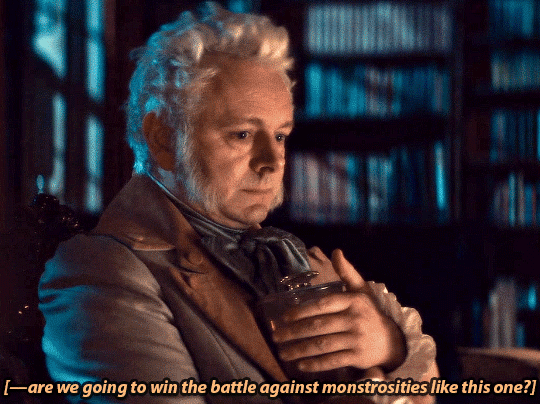
At this point, Aziraphale goes all in on body snatching being Good. Which... it still isn't because it is based on a broken system that disadvantages the poor? FOCUS, angel. He even goes as far as to offer to help Elspeth and Wee Morag in obtaining another corpse but note that again, he is on the LEFT -
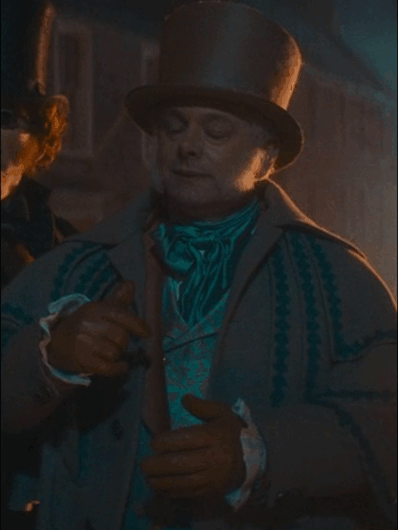
Remember, Wee Morag is deeply conflicted about the morality of body snatching, and instead of explaining anything to her (like, that having your body dissected won't keep you out of heaven would be start) Aziraphale just sort of joins Elspeth in pressuring her to join in - which is pretty awful and coercive, but gee if that isn't just heaven's playbook for doing Good, not good.
So we return to the graveyard, and this is where everything goes sideways. Aziraphale spends basically this entire sequence on the left. First, he notices the ingenuity of the grave guns but fails to acknowledge the travesty of so much energy being spent on protecting wealthy corpses while the poor suffer. Then, the tragedy strikes. After Wee Morag is shot, Aziraphale wastes time justifying saving her, resulting in her dying before he can act. And after all this, after the heart break of seeing her partner die, we see Elspeth come to the logical conclusion. If body snatching is Good, then might as well take Wee Morag off to Mr. Dalrymple, right?
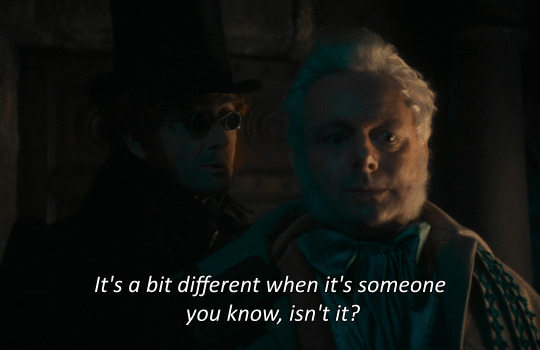
What shouldn't be overlooked is what takes place when Elspeth gets Wee Morag's body to Mr. Dalrymple. Because while Aziraphale is very clearly illustrating the dangers of black and white morality through religion, Dalrymple is showing that black and white morality through science is just as bad. Dalrymple has unshakable belief in the power of science and knowledge to alleviate human suffering and sees his work at Good. He cares about preventing illness, but ignore his role in perpetuating poverty - an unfortunate side effect of rigid belief systems of all shapes and sizes. He is downright cruel to Elspeth.

This is already getting real long, so we won't go into the absurdist comedy of the scene in the tomb - suffice to say that the surreal nature of Crowley's bargaining with Elspeth smacks of a fantastic tales of pacts made with the devil. It's delightfully unhinged.

The one line I think worth pointing out?
"Do I sound like a goat?"

I think this line is key in the narrative connection between the three minisodes in S2. All three flashbacks show Crowley and Aziraphale engaging in acts of deception, but they all have important differences:
In A Companion to Owls, the two work together, and they manage to pull off the trick and evade punishment.
In Nazi Zombies from Hell, Aziraphale comes up with a plan and Crowley goes along with it, and they barely manage to evade punishment.
In The Resurrectionists, Crowley comes up with a plan and Aziraphale goes along with it, and Crowley is sucked down to hell.
I think it's worth noting just how silly Crowley is in the first two minisodes. Bildad and Scottish Crowley are FUN even when dealing real heavy shit. Just a complete joy to watch. And we never see that level of silly from him again. Whatever happened in hell was clearly really bad since the next time we see him in St. James Park he is asking for holy water. He may have moments, but he is never the same.
Questions, comments, additional thoughts? Lay them on me. I'd love to dig into new lines of inquiry on this minisode because I just love it so much <3
#good omens#good omens meta#the resurrectionists#just theatre kid things#history is my jam#look the blocking has me feeling things#shades of gray
255 notes
·
View notes
Text
As far as they can
At the end of the Job minisode, Crowley inaugurates Their Side by proclaiming Aziraphale "an angel who goes along with Heaven... as far as he can," parallel to his own stated relationship with Hell.
Only it... doesn't actually work that way. Their exactlies are different exactlies.
Crowley defies and lies to Hell as often as he thinks he can get away with it. He never disabuses Downstairs of their misconceptions about his contributions to human atrocities. He cheerfully lies in his reports Downstairs, something Aziraphale briefly turns on his Baritone of Sarcastic Disapproval about in s1. Crowley even turns evil homeopathic in the latter part of the 20th century, likely in hopes that it will look good to head office while accomplishing essentially nothing. (This, of course, is another way he Crowleys himself, both with the London phone system and the M25.) After Eden, Crowley's default given an assignment from Hell is to see how he can subvert it.
Aziraphale, on the other hand, defies Her and Heaven as little as he possibly can. Sometimes, as with his sword giveaway, his compassion gets the better of his anxiety. Sometimes, as with Job's children in the destruction of the villa, he can try to stay within the letter of the law by leaving the defiance to Crowley.
His default, however, is "'m 'nangel. I can't dis- diso -- not do what 'm told." This comes out most often as respect for the Great/Divine Plan, which to him is sacrosanct. He sounds quite sincere in s1 when he says "Even if I wanted to help I couldn’t. I can’t interfere with the Divine Plan."
Aziraphale quite frequently Good Angels along by parroting Heaven's party line, whether it's "it'll all be rather lovely" or "I am good, you (I'm afraid) are evil" or droning on about evil containing the seeds of its own destruction, or condemning Elspeth's graverobbing as "wicked" (a stance he offers absolutely no reasoned support for, no logic, no "but She said," not a word -- that's very Heaven; most of Heaven's angels have the approximate brainpower of paramecia). Maestro Michael Sheen even has a particular voice cadence -- I think of it as Sententious Voice -- he uses when Aziraphale is thoughtlessly party-lining.
When the angel's conscience wars with his sense of Heaven's orthodoxy but (and this is an important but) he can't feasibly resist whatever's wrong, he offers strengthless party-line justifications he clearly doesn't agree with (as with the "rain bow" in Mesopotamia) or resorts to a Nuremberg defense: "I'm not consulted on policy decisions, Crowley!" Once or twice, he's even vocally aware of Heavenly hypocrisy: "Unless… [guns]'re in the right hands, where they give weight to a moral argument… I think." This isn't Sententious Voice. It's I-can't-disobey-and-I-hate-that voice.
But at base, the angel prefers obedience (not least because it's vastly safer), and he'd rather have someone else do his moral reasoning for him. Honestly? Pretty relatable. I know lots of people like this -- hell's bells, I've been this person, though I grew out of it somewhat -- and I daresay you do too. Moral reasoning is hard and often lonely (since it can be read as self-righteousness or even hypocrisy) and acting as it dictates can hurt. Nobody would need ethics codes if The Right Thing was also invariably The Convenient Thing.
Many GO fans find these Aziraphalean traits frustrating! Especially his repeated returns to parroting Heaven orthodoxy! Sometimes I do too! (Not least because I'm rather protective of my own integrity, and it's cost me quite a few times. I'm well-known in professional circles for picking up a rhetorical spear and tilting at the nearest iniquitous windmill. I often lose, but I sure do keep tilting. Every once in a blue moon I actually win one.)
The key, I think, to giving our angel a little grace on this (beyond honoring the gentle compassion that is pretty basic to his character) is noticing how often he can be induced to abandon an unconsidered Heavenish default stance. As irritating as his default is, and as consistently as he returns to it, it's not really that hard to talk him out of it. Crowley, of course, is tremendously good at knocking Aziraphale away from his default -- he's had to be. But Aziraphale even manages to talk himself away from his default once, in the form of the Ineffable Plan hairsplitting at the airbase!
I think the character-relevant point of the Resurrectionist minisode is making this breaking-the-Heavenish-default dynamic as clear as the contents of the pickled-herring barrel aren't. "That's lunatic!" Crowley exclaims, when Aziraphale Sententious Voicedly parrots Heaven's garbage about poverty providing extra opportunities for goodness. Aziraphale isn't quite ready to let go yet, replying "It's ineffable."
But Dalrymple (who, I think, parallels Heaven, perhaps even the Metatron -- there could be something decent there, but it's buried too deep under scorn and clueless privilege for any graverobber-of-souls to dig it out) manages to break Aziraphale's orthodoxy by explaining the child's tumor.
Once released from his orthodoxy, Aziraphale can't be trusted to handle moral reasoning well; his moral-reasoning ability is not-uncommonly (though not always) portrayed as vitiated. When he gives Elspeth the go-ahead to dig up more bodies, his excuses are just as vacuous as they were when he was convinced of her wickedness. He knows that he's crossed Heaven's line, too, and just as at Eden it's worrying him. That's why he has to talk to Crowley to nerve himself up to help Wee Morag... only he spends too much time talking, and it's too late.
But Crowley can then talk him into bankrolling Elspeth toward a better life. Aziraphale doesn't even put up any fight, both because he's compassionate and because Crowley is temporarily taking the place of Heaven (he's even Heaven-sized and staring down at them!) as the angel's moral compass.
S1 has an even worse example of Aziraphale's moral wavering, actually. Crowley yells "Shoot him, Aziraphale!" and Aziraphale sure does try to murder Adam. Again, he's adopting his morals from the nearest (and loudest) convenient source. Madame Tracy, thankfully, has enough of a moral backbone to save our angel from himself and Crowley.
(With my ersatz-ethicist hat on: this is a fight between utilitarianism and deontology. Crowley is the utilitarian, which is actually a bit of a departure for him, but he's admittedly desperate. Madame Tracy is the deontologist: One Doesn't Kill Children. Aziraphale is caught in the middle.)
I wouldn't be surprised if part of the reason we start s3 with Aziraphale and Crowley separated is so that Aziraphale finally has to do his own moral reasoning, without Crowley's nudges. I don't think it'll be easy for him. It will absolutely be lonely. And it may well hurt.
But I will watch for it, because it's how he will become his own angel, independent of Heaven and even of Crowley. And he must do that.
#good omens#good omens meta#aziraphale#the resurrectionists#good omens s3#s3 speculation#ethics#deontology#utilitarianism
176 notes
·
View notes
Text
That comma
Or, connections my brain makes when I don't sleep well for over a week because of a cold - read at your own risk :)
"I went to one meeting ten years ago. They were wittering on about the Christmas lights and passed a resolution condemning the improper use of apostrophes on signs in windows." (Mr. Arnold, s2e5)
This line always makes me laugh because I get super twitchy about certain grammar and punctuation errors. But errors happen, and you can usually tell what someone meant vs. what they wrote, so you correct it in your mind based on what you presume they meant and move on because there are bigger things to worry about in the world. Right?
Maybe we shouldn't always be so quick to presume and move on, though. Sometimes, things are supposed to be written a certain way for a reason. That reason is important, so we're taught the right way to write that thing. We all learn how to do it, and it's generally not something we screw up because there are consequences for doing it wrong. Like an address, for example. Addresses tell something or someone where to go. Maybe to a pub called The Resurrectionist - that one's at 66 Goat Gate in Edinburgh, right? It said so on the record that Maggie gave Aziraphale:
The Resurrectionist
66, Goat Gate
Edinburgh
Except - there's this annoying little comma in there that I've been ignoring for months. Right after the 66. Exactly where it shouldn't be - not if you're writing a street address. So I'm going to stop ignoring it and ask a question.
Is this actually a street address? I'm not questioning that the pub is in Edinburgh - that's well-established. It's that middle line - 66, Goat Gate - that I'm not sure of anymore. I'm having trouble making excuses for that comma.
If it isn't a street address, then what is it? I'm not sure, and I don't know if we have all the information to figure it out. My sleep-deprived brain has come up with a couple of crazy questions and ideas though. Starting with - what if the Clue is actually multiple Clues? What if we've just been thinking about the pub, but that second line contains a separate clue or clues about Edinburgh, so that Aziraphale Knows Where [He's] Going? (see what I did there?)
These ideas do require an assumption that we shouldn't just take season 2 at face value, but they aren't tied to any specific theories like time loops, dreams, etc.
This post from onceuponathyme about references to the number 66 in the show and promo posters, and gallup24's comment that the press pass in Newspaperman!Aziraphale's hat also has the number 66 on it got me thinking about whether the "address" and the hat are meant to be connected. The references to the number 66 could be an easter egg - the Book of Revelations is the 66th book of the Bible. But is it an in-show clue, too? Is the 66 on Everyday single telling Aziraphale to wear it on his hat, maybe as a signal to someone? ("The clarinet, it makes beautiful music.")
Moving on to Goat Gate. It could still be the name of a road. I have two other ideas though:
We've already seen goats turned into crows. Gate is an old term that can mean road or street. Goat Gate = Crow Road? (I don't know that I love this, but I'll put it out there anyway.)
There's also the symbolism of goats tied to Hell, Satan, and Crowley in particular - drconstellation has a lovely meta about sheep vs goats, so I'm not going to go any farther into that. But I do want to stay on Crowley, and the second place we see Aziraphale - the cemetery.
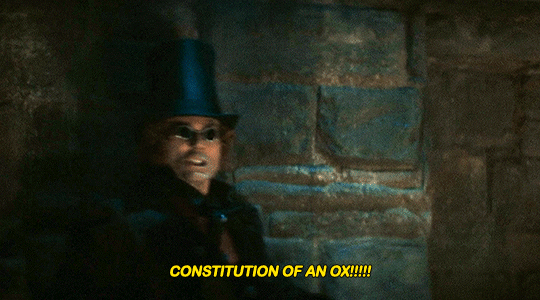
Not quite this, but I can find a gif for just about every other part of the scene except for the line I'm looking for. The one where after a bunch of hilarious noises, he says, "Do I sound like a goat?"
And then, a short while later...
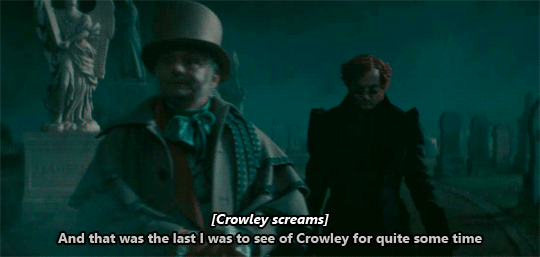
The ground opens up (a gate to Hell?), and Crowley disappears, pulled down to Hell. And then we get one continuous shot of Aziraphale turning around in that spot that starts in 1827 and ends in present day.
We still don't know exactly why Aziraphale went to the cemetery. Maybe "Goat Gate" is the clue that sent him there?
One final thing I noticed in that episode that feels a little off to me now - Crowley's reaction when Aziraphale calls and asks him if he remembers Mr. Dalrymple. "Oh yeah, not a doctor, a mister! Whatever happened to him?" It's surprisingly normal and relaxed, considering what happened at the end of the night, isn't it?
#sleep-deprived meta-ing#good omens#good omens 2#good omens meta#good omens clues#good omens analysis#good omens 1827#the resurrectionists#aziraphale#crowley
153 notes
·
View notes